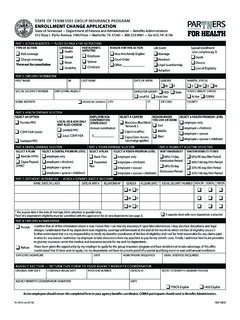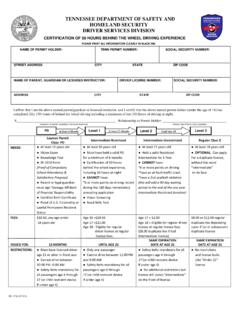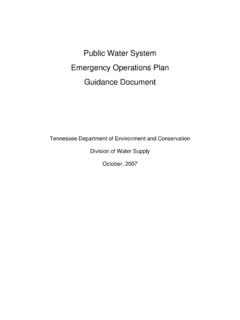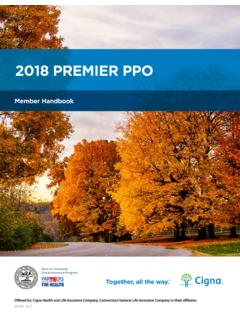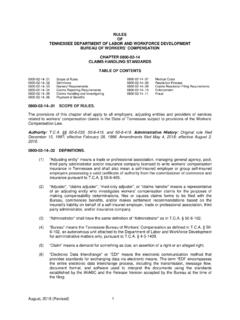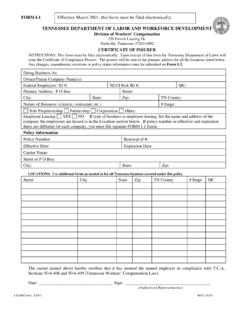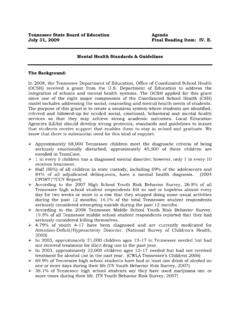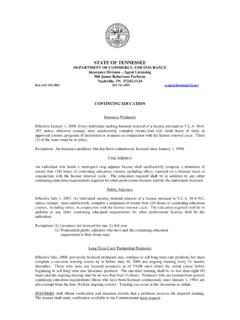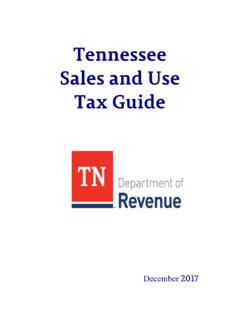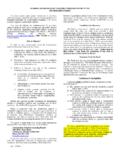Transcription of Protecting the Interests of Homeowners in Planned …
1 TACIRP ublication PolicyReports approved by vote of the Tennessee Advisory Commission on Intergovernmental Relations are labeled as such on their covers with the following banner at the top: Report of the Tennessee Advisory Commission on Intergovernmental Relations. All other reports by Commission staff are prepared to inform members of the Commission and the public and do not necessarily reflect the views of the Commission. They are labeled Staff Report to Members of the Tennessee Advisory Commission on Intergovernmental Relations on their covers. TACIR Fast Facts are short publications prepared by Commission staff to inform members and the public.
2 Tennessee Advisory Commission on Intergovernmental Relations226 Capitol Boulevard Building Suite 508 Nashville, Tennessee 37243 Phone: Fax: : Website: the Interests of Homeownersin Planned Developments:Insuring and Maintaining Common Property, Completing Infrastructure, and Providing Fair and Adequate RegulationMichael Mount, Research Associate Christopher Aldridge, Associate Leah Eldridge, Manager Bill Terry, Research Consultant Lynnisse Roehrich-Patrick, Director Cliff Lippard, Executive Director T eresa GibsonWeb Development & Publications ManagerJanuary 2015 Report of the Tennessee Advisory Commission on Intergovernmental RelationsTennessee Advisory Commission on Intergovernmental Relations.
3 This document was produced as an Internet publication. TO: Commission Members FROM: Lynnisse Roehrich-Patrick Executive Director DATE: 29 January 2015 SUBJECT: Homeowners Associations (House Bill 2070 by Farmer) Final Report The attached report is submitted for your approval. The report was prepared in response to House Bill 2070 by Farmer, which the House Local Government Subcommittee sent to the Commission for study. The bill as introduced would have required sellers to disclose whether their property is located in a Planned unit development (PUD), and if so, whether the PUD is complete.
4 The report meets the intent of House Resolution 170, referred to the Commission by the 107th General Assembly, which called on the Commission to study Homeowners Associations' (HOAs) rules and regulations and the responsibility of HOAs to insure their obligations. The report also considers issues raised by Senate Bill 2198 by Johnson and its companion, House Bill 2060 by Durham, which would have prevented HOAs from placing restrictions on parking on public streets and banning political signs on private property without the approval of the city or county legislative body and from imposing fines in excess of the monthly dues owed by property owners within the HOA.
5 Recommendations presented are summarized below. Requiring Adequate Insurance The Condominium Act of 2008 requires HOAs for condominiums created after January 1, 2009, to maintain property and liability insurance on common areas. Adopting such a provision for condominiums built before January 2, 2009, and for single-family developments would help ensure that adequate funds are available to make necessary repairs and pay liability claims for these developments as well as for condominiums built after that date, should the need arise.
6 The Condominium Act of 2008 requires all condominium HOAs to provide notice of coverage to all residential condominium owners upon request, but 226 Capitol Boulevard Bldg.,Suite 508 Nashville, Tennessee 37243-0760 Phone: (615) 741-3012 Fax: (615) 532-2443 there is no similar requirement for single-family developments. Adopting such a provision for single-family developments in Tennessee would ensure that all Homeowners have access to information about the insurance carried by their HOAs. Ensuring Maintenance of Common Areas and Completion of Infrastructure In order to protect their investment, developers maintain control over HOAs during construction until a date or event specified in the declaration, the governing document of the community.
7 If a developer has become insolvent and does not maintain the common areas, taking it to court might not work because an insolvent developer won t have the resources. Florida, a state with a long history of HOA developments, deals with this problem by requiring transfer of control of HOAs from developers to Homeowners when developers abandon their responsibility to maintain the common property or become insolvent. While this gives Homeowners control over the common areas, it does not ensure that they have the financial means to maintain them. Nevertheless, providing Homeowners this option could increase the likelihood that the common areas will not deteriorate.
8 In order to ensure that funds are available to complete infrastructure when homes in new developments don t sell rapidly enough to pay for it, counties and municipalities routinely require developers to guarantee that funds will be available, usually through letters of credit or surety bonds, to avoid having to use taxpayers dollars to complete the development. Unfortunately, there have been several instances where developers were unable to finish the infrastructure and local governments had allowed the bond or letter of credit to lapse. One way to avoid a lapse is to use automatically renewing letters of credit rather than surety bonds.
9 Regulating Homeowners and Others Conduct Because they are not subject to the constraints placed on governmental entities by the Constitution, HOAs can ban or regulate political signs. A number of states restrict their right to do this. Any prohibition against HOAs banning political signs should include authorization to determine the time, place, size, number, and manner of display of those signs. In order to avoid entangling Tennessee s cities and counties unnecessarily in the business of HOAs, any such prohibition should not be subject to local government control.
10 Some HOAs forbid parking on the streets within their boundaries, even where those streets are public, for safety and aesthetic reasons. Vehicles parked along the street obscure the view of drivers, potentially endangering pedestrians, and narrow streets are difficult for emergency vehicles to navigate. Forbidding HOAs to prohibit all parking on public streets would shift the burden of keeping them clear for safety reasons to local governments. Only two states limit HOAs power to regulate parking on public streets. HOAs in Nevada can prohibit parking only of certain large vehicles, while HOAs in Arizona cannot prohibit any parking on public streets.
